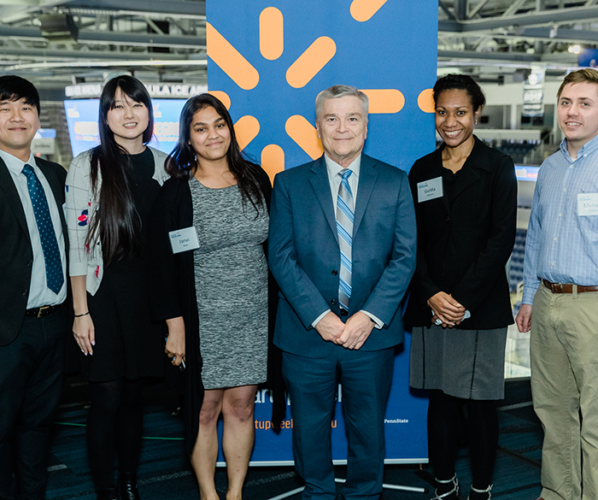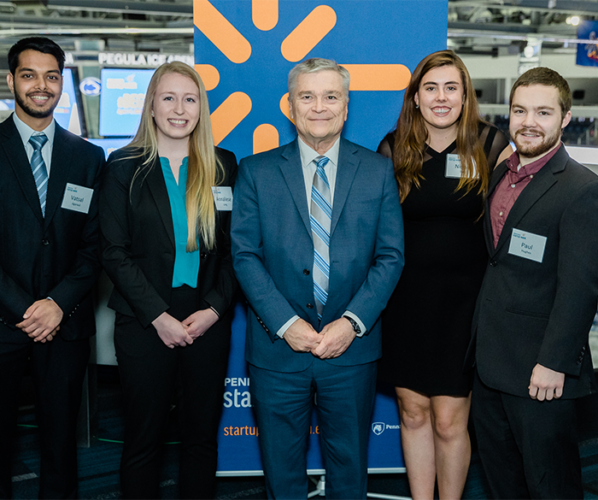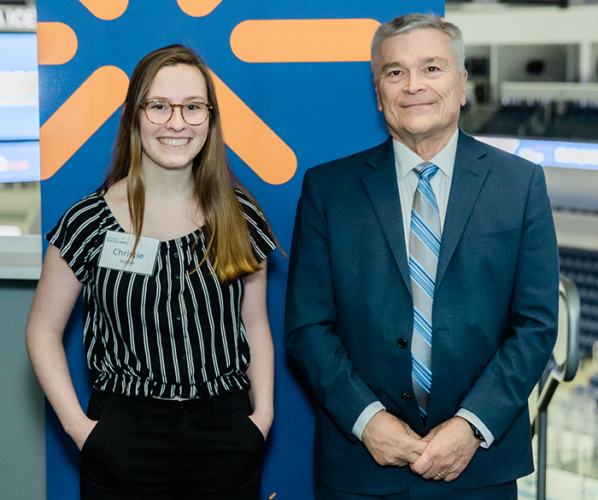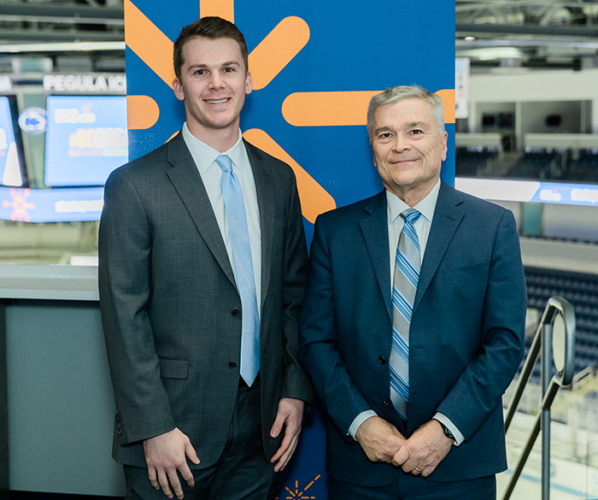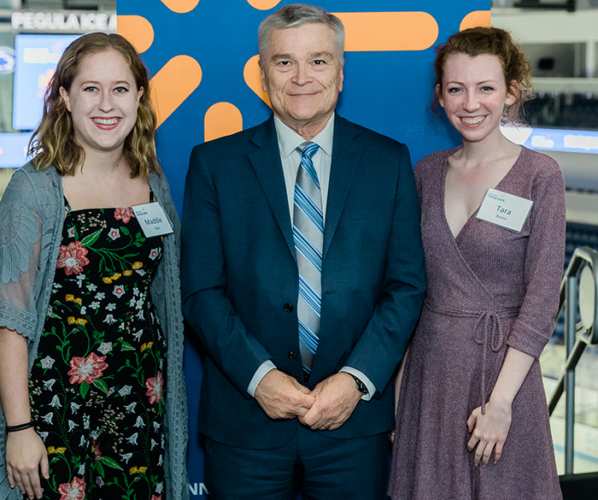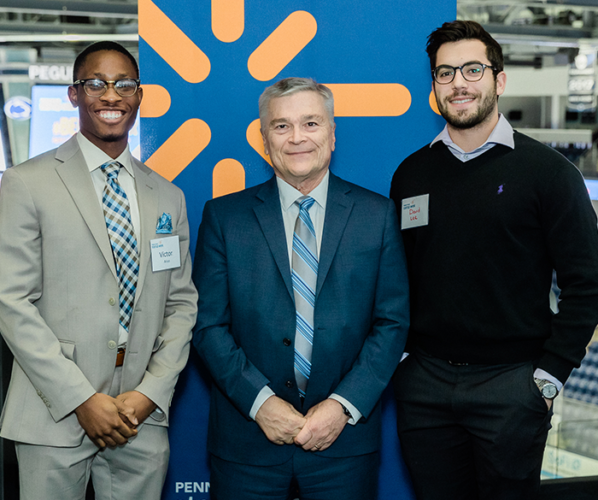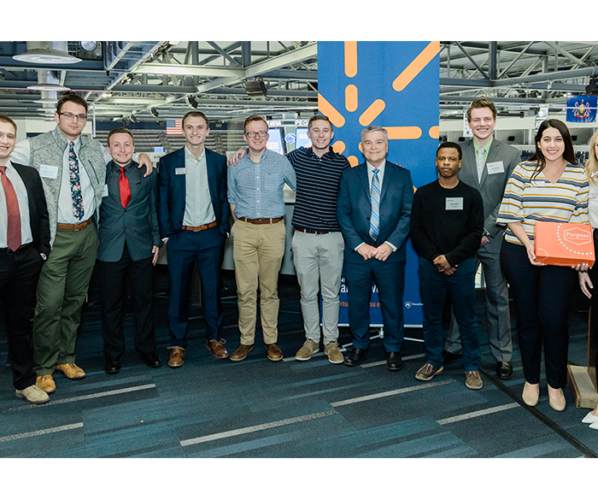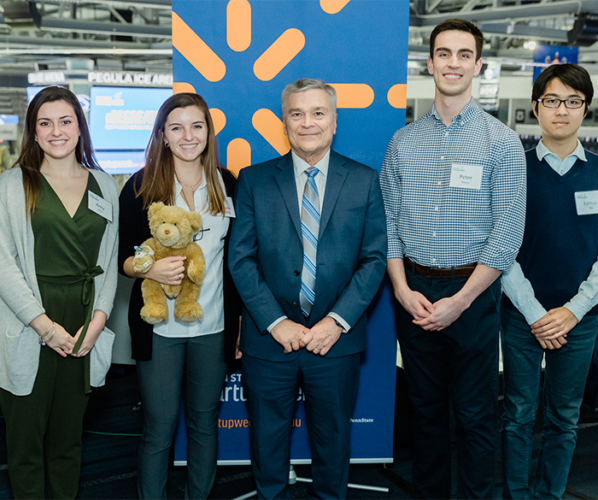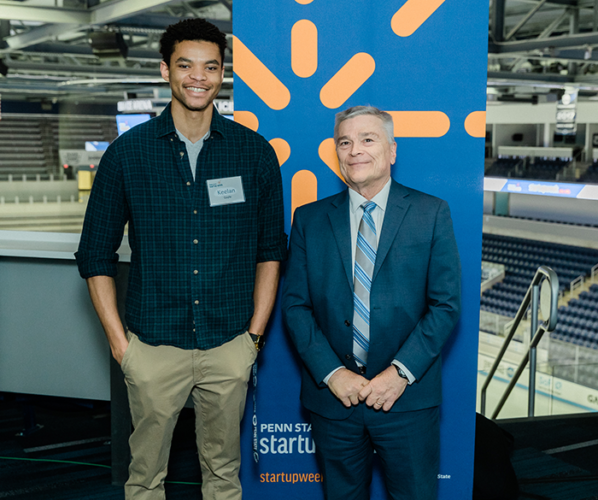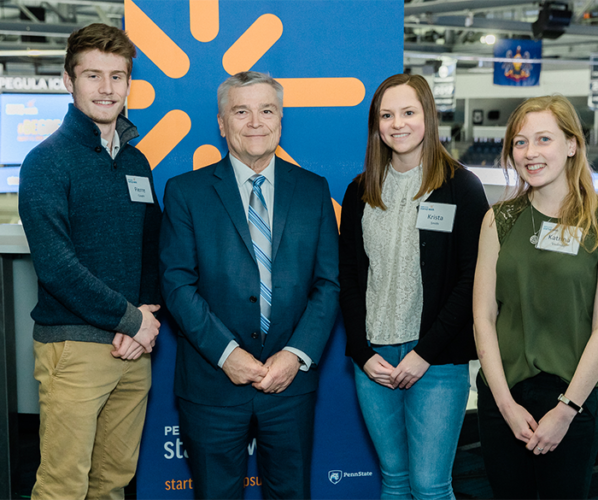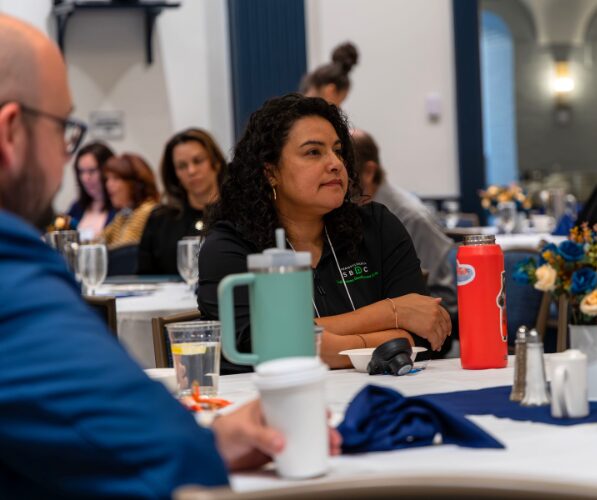Success Story
Penn State Startup Week’s 16 Pitch Competition & Challenge Winners
Through 16 competitions and challenges Penn State Startup Week gave student entrepreneurs from across the University the chance to pitch their business ideas and create inventive solutions to common problems during the April 1-5 event.
The challenges are at the heart of Startup Week’s mission of teaching and inspiring participants to make innovation a part of their lives, communities and careers, either by starting their own companies or bringing a problem-solving approach to established organizations. Through close collaboration with existing University programs, community partners and Invent Penn State, events also introduced participants to the innovation ecosystem and the abundant resources at Penn State and in its surrounding campus communities.
The 16 challenge and competition winners were:
Arts Business Idea Competition ($10,000 Prize), hosted by the College of Arts and Architecture, had students pitch ideas for arts-related businesses or non-profit organizations. Four finalists pitched their ideas for $10,000 in total awards.
Winner: Wavelength, a platform described as “LinkedIn for musicians combined with GoFundMe”. Wavelength provides independent artists with the tools, resources, education and connections needed to succeed in the digital revolution.
Ag Springboard Competition ($10,000 Prize), an invitation-only event hosted by the College of Agricultural Sciences, had teams of students pitched their ideas for a new business or non-profit in food, energy, ecosystems, bioproducts, community development or sustainability sectors to win a $7,500 grand prize and $2,500 second prize.
Winner: GreenBriq, developing a charcoal briquette product by harvesting an invasive weed species from Lake Victoria in Kenya and turning this into charcoal for cooking.
Nittany AI Challenge ($100,000 Prize), hosted by the Nittany AI Alliance, completed phase two of the Nittany AI Challenge and had teams of Penn State students, faculty and staff demonstrate their prototypes as they compete for $50,000 in awards by developing AI–based solutions that improve the Penn State student experience and/or University operations.
Winner: Revu, a solution to help keep students engaged when completing reading assignments. The AI powered application is designed to generate multiple-choice quizzes to help readers stay focused, while also testing their comprehension of key concepts.
Global Legal Hackathon, hosted by Penn State Law and part of a worldwide initiative, challenged students and legal professionals to conceptualize and design technology that addresses legal issues. The winning team received funding to travel to New York for the Global Legal Hackathon finals.
Winner: AuthenCheck, a blockchain-based e-discovery solution designed to help lawyers and courts to protect against and differentiate between the authentic digital evidence from manipulated digital evidence.
IdeaMakers Challenge, hosted by the College of Information Sciences and Technology, had students identify an important problem that could be solved by digital innovation and pitch their final ideas.
Winner: BASE (Beyond Average Sexual Education), a digital educational platform, aims to help teens, parents, and educators easily find relevant, accurate, and complete information about sex education.
Inc.U Competition, hosted by the Pennsylvania Technical Assistance Program (PennTAP), Inc.U showcased six finalist teams competing for $30,000. The challenge, which aims to fund new student companies, will conclude on April 6 with the taping of WPSU’s “The Investment 2019” TV show, but the winners will not be revealed until the episode airs this May.
Winner: winners will be announced in May when “The Investment” airs on WPSU. For more info click here
mHealth Challenge, hosted by the College of Health and Human Development, the College of Information Sciences and Technology, and the College of Nursing, showcased student winners who competed in November 2018 to develop a mobile application prototype that addressed a health problem for a specific target audience.
Winner: Pediatric Cub Companion, an innovative product that uses an app to control a Bluetooth speaker placed inside a stuffed bear to communicate with children about the treatment they are receiving for various health issues. The product was designed to reduce anxiety in pediatric cancer patients by providing comfort, knowledge and coping mechanisms.
Supply Chain Pitch Competition, hosted by the Smeal College of Business’ Department of Supply Chain and Information Systems, had four finalist student teams pitch ideas aimed at solving a supply chain problem or improving a supply chain product or process.
Wnner: GreenBriq developing a charcoal briquette product by harvesting an invasive weed species from Lake Victoria in Kenya and turning this into cooking charcoal.
Happy Valley Ventures Competition, hosted by Happy Valley Ventures, had student startup teams present their final pitches to win $3,500 in prizes from the Farrell Center for Corporate Innovation and Entrepreneurship, as well as to receive consideration for early stage investment.
Winner: CoachZone, a mobile sports application that merges the strengths of Madden and fantasy football, it allows fans to call their own plays in real-time and compare their “coaching” results to the in-game outcome of their favorite team.
3-Day Sustainability Mini-Challenge, coordinated by Lee Erickson, chief amplifier at Happy Valley LaunchBox powered by PNC Bank, and Dave Norloff, assistant teaching professor in the Donald P. Bellisario College of Communications, is designed to expose entrepreneurially minded students to the Design Thinking process and helps them to generate a solution to an identified problem related to sustainability at Penn State using human-centered design principles. This year students were challenged to develop concepts that would improve recycling at the HUB.
Winner: Krista Smith, Pierre Coupin, and Katrina Verlinde developed an innovative new recycling system to reduce confusion and incentivize recycling in the HUB-Robeson Center.
Commonwealth Campus Competitions and Challenges
Harrisburg, Elevator Pitch Competition 5.0, hosted by the Penn State Harrisburg Business Management Club, had student entrepreneurs pitch their business ideas for seed funding.
Winner: AMAL, a clothing line for conservative Muslim women and Orthodox Jewish women.
Mont Alto, $2,500 LION Tank Competition, hosted by Mont Alto LaunchBox, gave top teams startup funding, access to the Mont Alto LaunchBox, and additional services to help them go to market.
Winner: Beagle Technologies, provides simple tools and a modular system so anyone can experience drone racing.
New Kensington, Hack4Impact, hosted by the Corner LaunchBox and Penn State New Kensington, led teams of students to identify two key issues critical to revitalizing New Kensington—community perception and inclusiveness, and were challenged to develop solutions for these problems.
Results: A plan for a New Kensington cleanup crew comprised of high school and college-aged students and the proposed creation of a community forum where citizens can regularly come together to participate, engage in, and design solutions for New Kensington.
Schuylkill, LionLaunch Business Plan Competition, hosted by Penn State Schuylkill’s LionLaunch community-based entrepreneurship program, had finalists pitch their small business ideas and earn up to $5,000 and free office space.
Winner: Grantworks, LLC, a grant writing and consultation service.
Shenango, $500 Startup Challenge, hosted by Penn State Shenango’s innovation hub VenturePointe at the eCenter @ LindenPointe, had 19 participants pitch to be one of five teams selected to make it to the next level of challenge.
Winner: There was a tie for first place. The winning teams were The Oven Buddy and The Latch Patch. The Oven Buddy is an adaptive technology for individuals with mobility issues that allow the racks of an oven to slide out and raise to waist level if needed. The Latch Patch is a device to prevent children and the elderly from accidentally locking themselves in a room. The device allows doors to be completely closed for privacy without the worry of the door latching shut and locking.
Wilkes Barre, Innovation Challenge, hosted by Wilkes Barre’s innovation hub, the Think Center, in collaboration with four other universities, took place on February 4. The challenge had students pitch their ideas to the Wilkes-Barre Connect team.
Winner: Asher Smart, developed a modified tennis racket for tennis enthusiasts with lower back pain.
Startup Week originated in 2012 as IST Startup Week and became Penn State Startup Week in 2017, uniting numerous colleges, campuses, and units across the University. Its purpose is to showcase innovation in technology, health, the arts, education, sustainability, and global impact that is occurring daily at Penn State. This year’s Startup Week activities took place April 1-5 in 45 venues in eight colleges and on 11 campuses and featured 76 speakers, with half of those speakers being Penn State alumni or current students. Startup Week 2019 was made possible by the invaluable support of our corporate sponsors including Lockheed Martin, Ford, Leidos, IBM, M&T Bank Technology, Ernst & Young (EY), Corning, and the Penn State Sustainability Institute.


